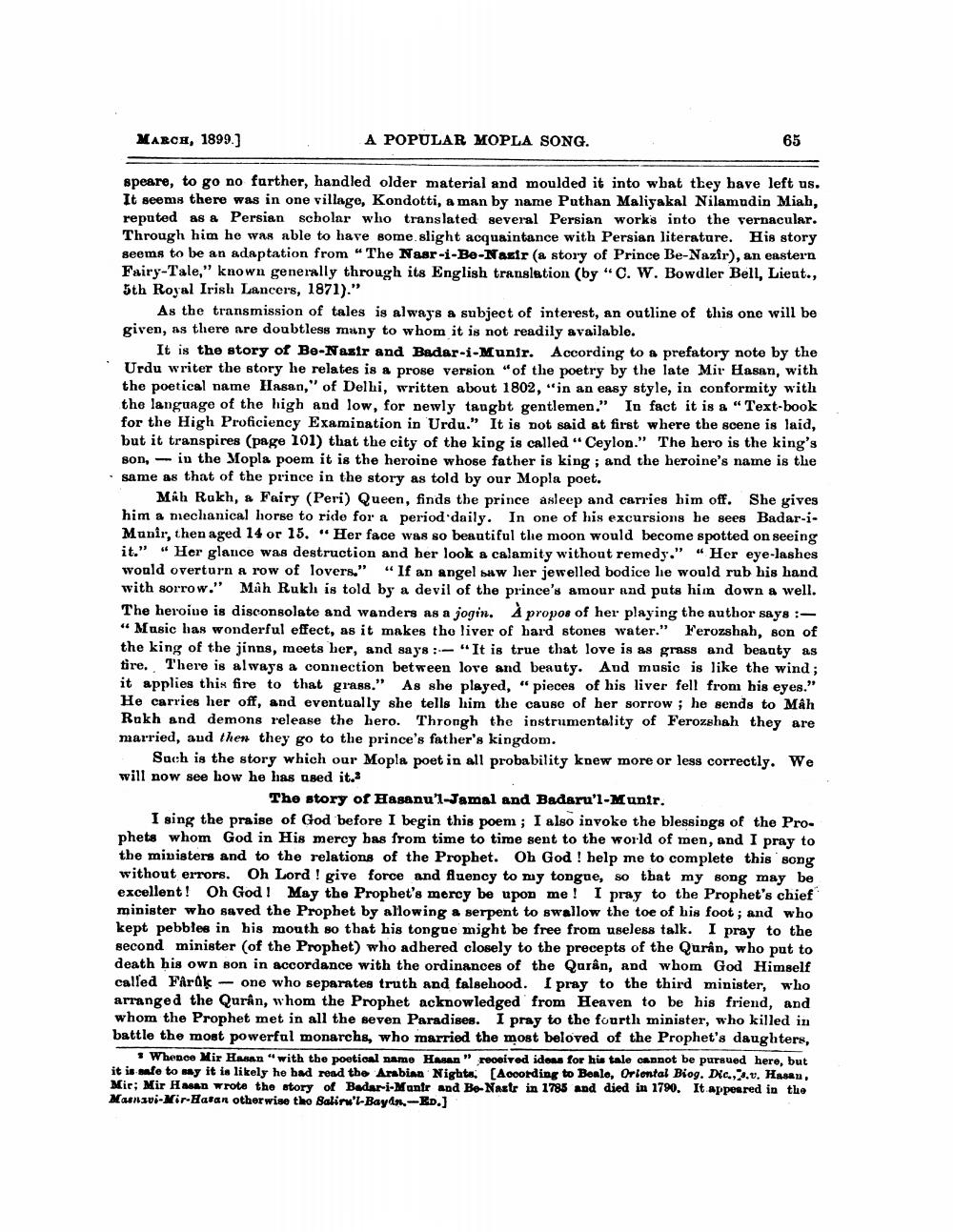________________
MARCH, 1899.]
A POPULAR MOPLA SONG.
65
speare, to go no further, handled older material and moulded it into what they have left us. It seems there was in one village, Kondotti, a man by name Puthan Maliyakal Nilamudin Miah, reputed as a Persian scholar who translated several Persian works into the vernacular. Through him he was able to have some slight acquaintance with Persian literature. His story seems to be an adaptation from "The Nasr-i-Be-Nazir (a story of Prince Be-Nazir), an eastern Fairy-Tale," known generally through its English translation (by "C. W. Bowdler Bell, Lieut., 5th Royal Irish Lancers, 1871)."
As the transmission of tales is always a subject of interest, an outline of this one will be given, as there are doubtless many to whom it is not readily available.
It is the story of Be-Nasir and Badar-i-Munir. According to a prefatory note by the Urdu writer the story he relates is a prose version "of the poetry by the late Mir Hasan, with the poetical name Hasan," of Delhi, written about 1802, "in an easy style, in conformity with the language of the high and low, for newly taught gentlemen." In fact it is a "Text-book for the High Proficiency Examination in Urdu." It is not said at first where the scene is laid, but it transpires (page 101) that the city of the king is called "Ceylon." The hero is the king's in the Mopla poem it is the heroine whose father is king; and the heroine's name is the same as that of the prince in the story as told by our Mopla poet.
son,
Mah Rukh, a Fairy (Peri) Queen, finds the prince asleep and carries him off. She gives him a mechanical horse to ride for a period daily. In one of his excursions he sees Badar-iMunir, then aged 14 or 15. "Her face was so beautiful the moon would become spotted on seeing it." "Her glance was destruction and her look a calamity without remedy." "Her eye-lashes would overturn a row of lovers." "If an angel saw her jewelled bodice he would rub his hand with sorrow." Mah Rukh is told by a devil of the prince's amour and puts him down a well. The heroine is disconsolate and wanders as a jogin. À propos of her playing the author says:"Music has wonderful effect, as it makes the liver of hard stones water." Ferozshah, son of the king of the jinns, meets her, and says: "It is true that love is as grass and beauty as tire. There is always a connection between love and beauty. And music is like the wind; it applies this fire to that grass." As she played, "pieces of his liver fell from his eyes." He carries her off, and eventually she tells him the cause of her sorrow; he sends to Mâh Rukh and demons release the hero. Through the instrumentality of Ferozshah they are married, and then they go to the prince's father's kingdom.
Such is the story which our Mopla poet in all probability knew more or less correctly. We will now see how he has used it."
The story of Hasanu'l-Jamal and Badaru'l-Munir.
I sing the praise of God before I begin this poem; I also invoke the blessings of the Prophets whom God in His mercy has from time to time sent to the world of men, and I pray to the ministers and to the relations of the Prophet. Oh God! help me to complete this song without errors. Oh Lord! give force and fluency to my tongue, so that my song may be excellent! Oh God! May the Prophet's mercy be upon me! I pray to the Prophet's chief minister who saved the Prophet by allowing a serpent to swallow the toe of his foot; and who kept pebbles in his mouth so that his tongue might be free from useless talk. I pray to the second minister (of the Prophet) who adhered closely to the precepts of the Quran, who put to death his own son in accordance with the ordinances of the Quran, and whom God Himself called Farakone who separates truth and falsehood. I pray to the third minister, who arranged the Quran, whom the Prophet acknowledged from Heaven to be his friend, and whom the Prophet met in all the seven Paradises. I pray to the fourth minister, who killed in battle the most powerful monarchs, who married the most beloved of the Prophet's daughters,
Whence Mir Hasan "with the poetical name Hasan" received ideas for his tale cannot be pursued here, but it is safe to say it is likely he had read the Arabian Nights. [According to Beale, Oriental Biog. Dic.,.v. Hasan, Mir; Mir Hasan wrote the story of Badar-i-Mantr and Be-Nastr in 1785 and died in 1790. It appeared in the Masnavi-Mir-Hasan otherwise the Saliru'l-Bayan.-ED.]




